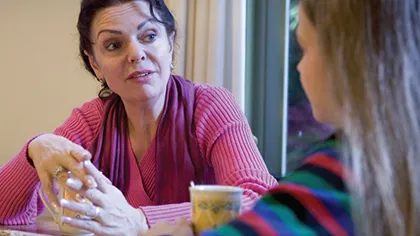Family therapy for adolescents with anorexia
Our researchers pioneered the use of family therapy for anorexia, an intervention that is now recommended across the UK and...
30 July 2013
Our researchers designed training to help parents and other carers better support someone who has anorexia and speed their recovery.
Research led by Professors Janet Treasure & Ulrike Schmidt
Our researchers designed training to help parents and other carers better support someone who has anorexia and speed their recovery.

The ‘New Maudsley Method’ involves training to help parents and other family members better support someone who has anorexia and speed their recovery. Designed by our researchers, it is now available across England through workshops, and film and book resources.
‘Anorexia can provoke an intense emotional response from family members,’ says Professor Janet Treasure from our Section on Eating Disorders. ‘Watching someone you love starve themselves can be frightening and extremely stressful. Parents and other carers don’t really know what the illness is and are often uncertain about their own role. They often have no idea how to help, or how to react to, or manage, problems that arise. The skills parents and other carers need at home are similar to those needed by professionals working on specialised units.
’The New Maudsley Method – also known as Maudsley Collaborative Care skills training – helps family members learn techniques that can help facilitate weight gain, re-establish healthy eating, deal with crises and conflicts at home, and assess risk.
Family members are given information about anorexia and also learn to cope with, and reduce, their own anxiety. This is in turn can help the person who has anorexia. Professor Treasure’s research has shown that stress at home, and particularly anxiety, can inhibit recovery and even encourage the eating disorder to thrive.
‘We explain to carers what is happening and give them some motivational interviewing and communication skills to help them become for adept at managing the symptoms’ says Professor Treasure. ‘We aim to give them the skills and knowledge they need to be a coach, to help the person with an eating disorder break free from the traps that block recovery.’
A large proportion of people who have anorexia – mostly women – first become unwell during their teenage years and early 20s, when many of them are still living at home with their parents. The New Maudsley Method was developed after a series of research projects that sought to find out about the experience of living with and supporting someone who has anorexia, and then examined how different caring styles had an impact on the symptoms of the eating disorder.
The research team also discovered that many parents were depressed and anxious, felt under-supported and wanted to know about the best way of helping at home.
All the elements of the New Maudsley Method have been tested in subsequent research studies and our researchers continue to explore different ways of delivering and enhancing the training. For example, the ECHO study (Expert Carers Helping Others) is assessing the success of telephone coaching for parents of young people who have recently become unwell, offered by other, more ‘experienced’ parents who have been trained to offer support.
Our researchers have helped Beat (the eating disorders charity) develop a course of eight workshops run by trained volunteers that teaches family members how to become ‘expert change coaches’. A series of films made by and featuring our researchers illustrate how to deal with common problems at home and explain how family members’ reactions can enhance or reduce symptoms of anorexia.
Workshops for family members are now an integral part of the clinical services offered by the South London and Maudsley NHS Foundation Trust. Staff on the eating disorders ward organise four half-day sessions for patients’ parents and family members. People seen in the outpatient clinic are routinely offered the chance to attend eight two- hour training sessions.